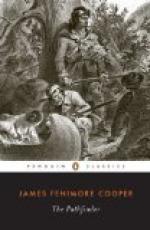“You’re over boastful this morning, Pathfinder; but you’ll find you’ve no green boy fresh from the settlements and the towns to deal with, I will assure ye!”
“I know that well, Quartermaster; I know that well, and shall not deny your experience. You’ve lived many years on the frontiers, and I’ve heard of you in the colonies, and among the Indians, too, quite a human life ago.”
“Na, na,” interrupted Muir in his broadest Scotch, “this is injustice, man. I’ve no’ lived so very long, neither.”
“I’ll do you justice, Lieutenant, even if you get the best in the potato trial. I say you’ve passed a good human life, for a soldier, in places where the rifle is daily used, and I know you are a creditable and ingenious marksman; but then you are not a true rifle-shooter. As for boasting, I hope I’m not a vain talker about my own exploits; but a man’s gifts are his gifts, and it’s flying in the face of Providence to deny them. The Sergeant’s daughter, here, shall judge between us, if you have the stomach to submit to so pretty a judge.”
The Pathfinder had named Mabel as the arbiter because he admired her, and because, in his eyes, rank had little or no value; but Lieutenant Muir shrank at such a reference in the presence of the wives of the officers. He would gladly keep himself constantly before the eyes and the imagination of the object of his wishes; but he was still too much under the influence of old prejudices, and perhaps too wary, to appear openly as her suitor, unless he saw something very like a certainty of success. On the discretion of Major Duncan he had a full reliance, and he apprehended no betrayal from that quarter; but he was quite aware, should it ever get abroad that he had been refused by the child of a non-commissioned officer, he would find great difficulty in making his approaches to any other woman of a condition to which he might reasonably aspire. Notwithstanding these doubts and misgivings, Mabel looked so prettily, blushed so charmingly, smiled so sweetly, and altogether presented so winning a picture of youth, spirit, modesty, and beauty, that he found it exceedingly tempting to be kept so prominently before her imagination, and to be able to address her freely.
“You shall have it your own way, Pathfinder,” he answered, as soon as his doubts had settled down into determination; “let the, Sergeant’s daughter — his charming daughter, I should have termed her — be the umpire then; and to her we will both dedicate the prize, that one or the other must certainly win. Pathfinder must be humored, ladies, as you perceive, else, no doubt, we should have had the honor to submit ourselves to one of your charming society.”
A call for the competitors now drew the Quartermaster and his adversary away, and in a few moments the second trial of skill commenced. A common wrought nail was driven lightly into the target, its head having been first touched with paint, and the marksman was required to hit it, or he lost his chances in the succeeding trials. No one was permitted to enter, on this occasion, who had already failed in the essay against the bull’s-eye.




